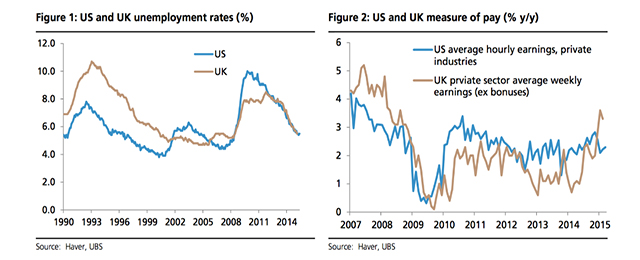There are a number of similarities currently between the labour markets of the United States and the United Kingdom. Most obviously both have the same unemployment rate at 5.5%. Employment has also been growing at fairly similar rates of growth. In the US the household survey shows employment up 2.0% in the year to May, in the UK Labour Force Survey (LFS) employment was up 1.4% in the three months to April.
The latter point might seem obvious given the unemployment rates in the UK and US are the same, but of course the missing ingredient is what is going on in labour market participation. And here too the UK and US trends have become more similar. In the US the participation has levelled out after a long period of declines, while in the UK has also been relatively constant in the recent past, after a post- crisis period of increases.
Indicators of labour demand are less comparable across the two economies, but both appear consistent with continued momentum in each economy’s labour market. In the US the JOLTS rate is the highest it has been since the early 2000s. In the UK the vacancy rate is similarly elevated.
With pay growth picking up in both countries
And the starkest thing to note of all perhaps is that there is now reasonable evidence that wage growth in both the US and UK is picking up. In the US average hourly earnings were at 2.3% y/y in May, up from a low of 1.8% in December. Other measures of pay pressure in the US, such as the ECI and ECEC, are if anything showing a more pronounced pick up.
In the UK, this week’s labour market release underlined once again that pay growth appears to be trending higher here too. The headline average weekly earnings series rose 2.7% in the three months to April compared to a year earlier. The compares to pay growth at the start of the year around 2.0%. Excluding bonuses the rise in pay growth is even more stark at 2.9%, up from 1.6% in January.
The strong US labour market position has served to harden views that the FOMC is poised to rate the federal funds rates in September. It is fair to say, however, that the market is somewhat more equivocal about the timing of the first hike in the UK.






Be the first to comment on "US and UK separated by a common labour market performance?"